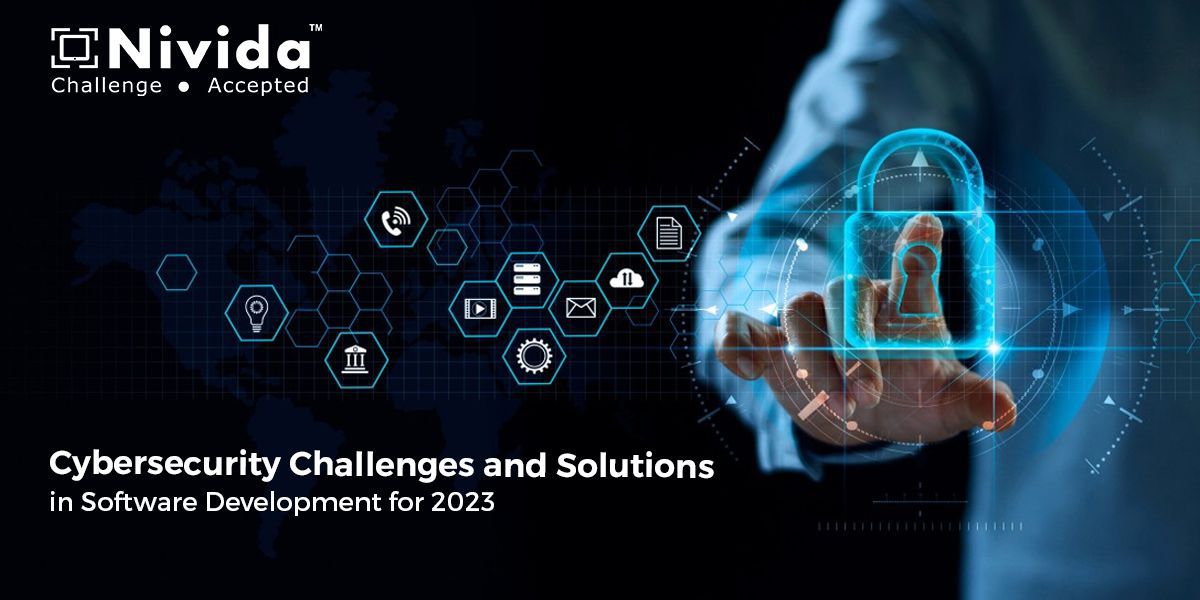In the dynamic and ever-changing digital environment of the year 2023, the creation of software holds significant importance for enterprises seeking to maintain their competitiveness and relevance. Nevertheless, the proliferation of advanced cyber threats poses substantial obstacles for software development firms and their clientele. This blog aims to examine the cybersecurity difficulties encountered by Software development companies in Vadodara, Gujarat, India. Additionally, it will delve into potential solutions that may be implemented to safeguard the security of software applications.
The Paramount Importance of Cybersecurity in Software Development:
The importance of cybersecurity in the world of software development cannot be understated, as it serves as the foundation for ensuring the protection of sensitive data, upholding user privacy, and maintaining the integrity and performance of software applications. This discourse explores the significant significance of cybersecurity within the domain of software development.
- Protection Against Malicious Threats:
- Preservation of Data Integrity:
- User Trust and Confidence:
- Compliance with Legal and Regulatory Requirements:
- Protection of Intellectual Property:
- Mitigation of Financial Loss:
- Maintaining Business Continuity:
- Enhanced Reputation and Brand Image:
The need for safeguarding against malicious threats is growing due to the rising complexity and prevalence of cyber threats. The prevalence of malware, ransomware, phishing attacks, and other malicious activities is widespread inside the digital domain. The integration of cybersecurity protocols into the software development process serves as a protective barrier against malevolent assaults. The early identification of vulnerabilities during the development process and the subsequent fortification of software against potential exploitation are beneficial.
Ensuring data integrity is an essential component of every software application. Cybersecurity measures are implemented to protect data from unauthorised alterations, hence preserving its integrity, coherence, and dependability. Ensuring the preservation of data integrity is of utmost importance, particularly within industries such as finance, healthcare, and e-commerce, where the precision of data holds significant weight in decision-making processes and the establishment of trust.
Users exhibit a significant level of faith in software applications, especially in terms of their ability to effectively manage and safeguard their personal and confidential data. The implementation of cybersecurity measures instils a sense of assurance among users, as it guarantees the secure handling and storage of their data. The occurrence of a security breach not only poses a threat to user confidence but also exposes the software development organisation to potential legal and financial consequences.
Compliance with legal and regulatory requirements necessitates adherence to cybersecurity best practices, particularly within industries that manage sensitive data, such as healthcare (HIPAA) or finance (PCI-DSS). Failure to comply with these regulatory criteria can lead to significant penalties and legal ramifications. Consequently, the incorporation of cybersecurity measures into the process of software development guarantees adherence to obligatory regulatory frameworks.
Intellectual property (IP) holds significant value for numerous enterprises. Cybersecurity measures are implemented to protect intellectual property (IP) by mitigating the risks associated with unauthorised access, copying, or theft. Safeguarding intellectual property (IP) is of utmost importance in order to preserve a competitive advantage in the market, encompassing proprietary algorithms, business strategies, and distinctive features.
The mitigation of financial loss is a crucial aspect when addressing the consequences of cyber-attacks, as they can result in substantial economic ramifications. The financial implications associated with combating a cyber-attack, recovering from a data breach, and providing compensation to affected users can be exorbitant. The implementation of effective cybersecurity safeguards during the software development process aids in mitigating the potential financial losses that may arise from cyber incidents.
The preservation of business continuity is of utmost importance as cyber-attacks have the potential to cause significant disruptions to business operations, resulting in periods of downtime and substantial financial losses. A software program that is well-secured plays a crucial role in maintaining company continuity by mitigating the adverse effects of cyber attacks. The expeditious recuperation and reinstatement of services can be achieved through the implementation of robust security measures.
The reputation and brand image of a corporation, which may have been cultivated over a significant period of time, might be negatively impacted by a single cyber incident. The implementation of proactive cybersecurity measures signifies a dedication to safeguarding information and upholding professional standards, thereby bolstering the reputation of the organisation and cultivating confidence among both current and prospective clientele.
The Current Landscape of Cybersecurity in Software Development:
The year 2023 presents a confluence of promising prospects and formidable obstacles within the world of software development. The increasing sophistication and ubiquity of cyber dangers are directly correlated with the advancements in technology. Software development companies in Gujarat, India, are currently facing a multitude of cybersecurity difficulties that possess significant ramifications for both their projects and clientele.
Cyber risks manifest in diverse ways, encompassing malware, ransomware, phishing attacks, and data breaches. The aforementioned risks have the potential to exploit vulnerabilities present in software programs, resulting in the compromising of sensitive data, intellectual property, and the overall integrity of a system. In order to mitigate these risks, it is imperative for Software development companies in India to implement proactive cybersecurity measures and adhere to best practices across the entirety of the development lifecycle.
Cybersecurity Challenges in Software Development:
- Vulnerability Exploitation:
- Insufficient Security Knowledge:
- Data Breaches:
- Inadequate Authentication and Authorization:
- Insecure APIs:
Software applications frequently possess vulnerabilities that can be exploited by malicious actors in the cyber universe. These vulnerabilities can potentially emerge due to improper coding practices, inadequate security testing, or the utilisation of obsolete libraries or frameworks.
It is evident that not all developers possess a comprehensive understanding of cybersecurity principles and optimal methodologies. A lack of expertise in this field may result in the inadvertent development of vulnerabilities within the software.
Data breaches pose a significant concern for software development companies. A breach has the potential to lead to unauthorised acquisition of sensitive user data, financial detriment, and a compromised reputation.
The implementation of ineffective or inappropriate authentication and authorization procedures might grant unauthorised individuals access to crucial system functionality and data, hence posing a security threat.
The significance of APIs (Application Programming Interfaces) in contemporary software applications cannot be overstated. Nevertheless, the utilisation of insecure APIs can be manipulated in order to attain unauthorised entry into a system or initiate malicious activities such as SQL injection or cross-site scripting.
Cybersecurity Solutions in Software Development:
- Regular Security Training and Awareness:
- Code Reviews and Static Analysis:
- Penetration Testing:
- Secure Coding Standards:
- Use of Secure Libraries and Frameworks:
- Encryption and Data Protection:
- Multi-Factor Authentication (MFA):
- Regular Security Updates and Patch Management:
It is imperative for Software development companies in Vadodara, Gujarat, India to allocate resources towards implementing routine cybersecurity training programmes for their developers. This practice aids in augmenting individuals' comprehension of security principles and cultivates a prioritisation of security in the development procedure.
The implementation of thorough code reviews and static code analysis can effectively detect security issues at an early stage of the software development lifecycle. The implementation of this proactive strategy enables prompt correction and minimises the vulnerability of possible attacks.
Penetration testing, often known as ethical hacking, is a systematic process of assessing the security of software applications. By simulating real-world cyber-attacks, this practice aims to identify vulnerabilities and offer significant insights for enhancing the application's security posture. Regularly conducting penetration tests can contribute to the overall improvement of software application security.
The implementation and enforcement of secure coding standards within the development team are crucial in ensuring that security is given due importance throughout the entirety of the software development lifecycle. By adhering to secure coding norms that are recognised within the industry, the occurrence of vulnerabilities can be considerably reduced.
The utilisation of up-to-date and secure libraries and frameworks is recommended for Software development companies in Gujarat, India in order to mitigate the potential risks associated with the use of outdated or vulnerable components.
To ensure the security of sensitive data, it is imperative to employ robust encryption techniques for both data in transit and data at rest. Furthermore, it is imperative to implement robust data access controls in order to guarantee that only authorised individuals are granted access to designated information.
Multi-factor authentication (MFA) is implemented to enhance security measures by introducing an extra layer of verification, hence increasing the difficulty for unauthorised individuals to gain access to the system.
Regular security updates and patch management are essential practices in maintaining the security of software applications. It is crucial to ensure that the newest security patches and updates are immediately installed in order to address identified vulnerabilities. Implementing a comprehensive patch management protocol is necessary in order to guarantee the prompt and efficient deployment of patches.
Final Thoughts:
The significance of cybersecurity in the context of advancing software development in 2023 cannot be overemphasised. It is imperative for Software development companies in Vadodara, Gujarat, India to accord utmost importance to cybersecurity right from the initiation of each project. Through the acknowledgement and resolution of the aforementioned obstacles, it is possible to collaboratively establish a fortified digital milieu that ensures enhanced security for both enterprises and individuals.
Nivida Web Solutions ranks among the leading Software development companies in India and demonstrates a steadfast dedication to maintaining a leading position in the realm of cybersecurity practices. This commitment is reflected in our approach to software development projects, which prioritises resilience, security, and the ability to survive the ever-changing landscape of cyber attacks. Feel free to reach out to us at your earliest convenience to acquire further information regarding our expertise in designing and implementing safe software solutions that are customised to meet your unique demands and specifications.

